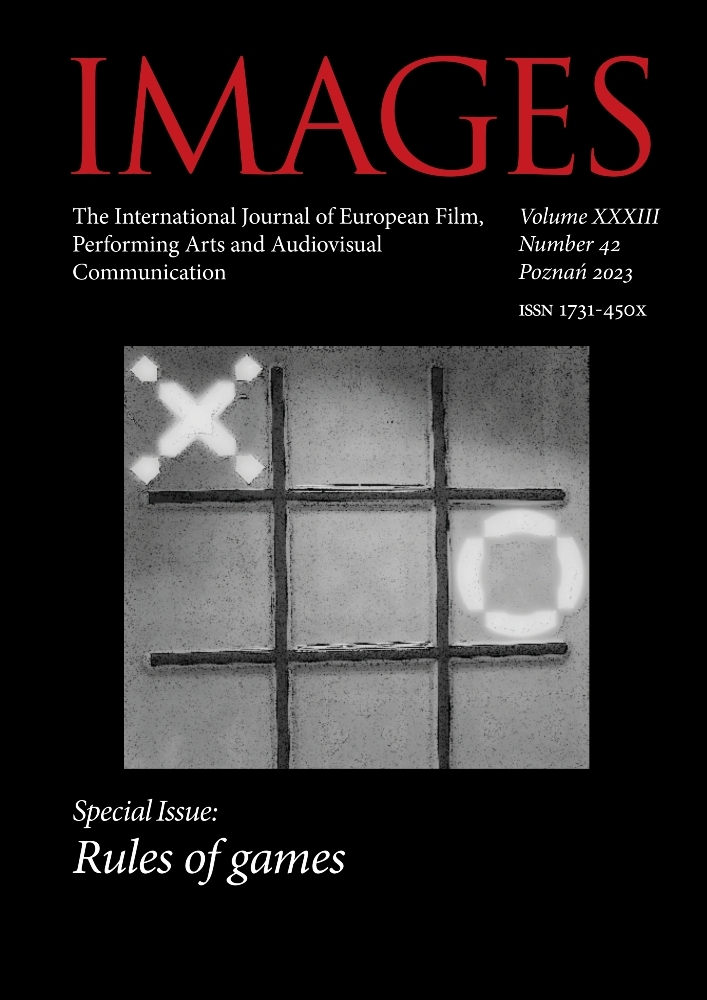Abstract
The article undertakes an analysis of the only romantic plot for a female character in Baldur’s Gate II: Shadows of Amn, namely the romance with Anomen, one of the player character’s potential companions. The analysis focuses primarily on how this romance adapts themes of courtly love to the poetics of the digital game medium. Courtly love is treated here not as a realistically depicted medieval tradition but rather as an established pop-cultural reference to the literature of the period, and as an element of contemporary depictions of the Middle Ages, often serving as a way to present contemporary themes and beliefs. The analysis therefore aims to explore how the theme can be employed to reproduce contemporary patterns of romantic relationships within a game, and in the case of Anomen, how it reproduces patterns of unequal emotional labor in heterosexual relationships. The article thus seeks to show how digital games can function as tools of cultural discourse of love by implementing certain patterns of romantic love through their specific means of expression.
References
Aarseth E., Quest Games as Post-Narrative Discourse, [w:] Narrative Across Media: The Languages of Storytelling, red. Marie-Lauren Ryan, Lincoln 2004, s. 361–376
Bayerle A., Feminism 101: What is Emotional Labor?, „FEM Newsmagazine” 11.02.2018, https://femmagazine.com/feminism-101-what-is-emotional-labor (dostęp: 1.09.2022)
Boase R., The Origin and Meaning of Courtly Love: A Critical Study of European Scholarship, Manchester 1977
Bogost, I., The Rhetoric of Video Games [w:] The Ecology of Games: Connecting Youth, Games, and Learning, red. K. Salen, Cambridge 2008, s. 121–140
Bolton S.C., Boyd C., Trolley Dolly or Skilled Emotion Manager? Moving on from Hochschild’s Managed Heart, „Work, Employment and Society” 2003, nr 17(2), s. 289–308. DOI: https://doi.org/10.1177/0950017003017002004
Burge A., Gratzke M., Special Issue: Critical Love Studies (Editors’ Introduction), „Journal of Popular Romance Studies” 2017, nr 6
Campbell J., The Hero with a Thousand Faces, New York 1949
Cormier R.J., „You Make Me Want to Be a Better Man”: Courtly values Revived in Modern Film, [w:] The Legacy of Courtly Literature, red. D. Nelson-Campbell, R. Cholakian, London 2017, s. 77–88. DOI: https://doi.org/10.1007/978-3-319-60729-0_5
Digital Love: Romance and Sexuality in Video Games, red. H. McDonald, Boca Raton – London – New York 2017
Fantasy and Science-Fiction Medievalisms: From Isaac Asimov to a Game of Thrones, red. H. Young, Amherst – New York 2015
Fay E., Romantic Medievalism: History and the Romantic Literary Ideal, London 2002 DOI: https://doi.org/10.1057/9781403913616
Frankel V.E., From Girl to Goddess: The Heroine’s Journey through Myth and Legend, Jefferson 2010
Game Love: Essays on Play and Affection, red. J. Enevold, E. MacCallum-Stewart, Jefferson 2015
Garda M.B., Interaktywne fantasy. Gatunek w grach cyfrowych, Łódź 2016 DOI: https://doi.org/10.18778/7969-619-2
Giddens, A., The Transformation of Intimacy: Sexuality, Love, and Eroticism in Modern Societies, Stanford 1992
Goodman Wollock, J., Courtly love, [w:] The Encyclopedia of Medieval Literature in Britain, red. S. Echard, R. Rouse, New York 2017. DOI: https://doi.org/10.1002/9781118396957.wbemlb245
Hochschild A.R., The Managed Heart: Commercialization of Human Feeling, Berkeley 1983
Howard J., Quests: Design, Theory, and History in Games and Narratives, Natick 2008 James N., Emotional Labour: Skill and Work in the Social Regulation of Feelings, „The Sociological Review” 1989, nr 37(1), s. 15–42. DOI: https://doi.org/10.1111/j.1467-954X.1989.tb00019.x
Kaufman A., Medieval Unmoored, [w:] Studies in Medievalism XIX: Defining Neomedievalism(s), red. K. Fugelso, Rochester 2010, s. 1–11, http://www.jstor.org/stable/10.7722/j.ctt14brsr8 (dostęp: 18.08.2022) DOI: https://doi.org/10.1017/9781846158292.001
Krawczyk S., „Przed wyruszeniem w drogę należy zebrać drużynę”. Dlaczego gry komputerowe z przełomu wieków wpłynęły na tożsamość polskich graczy?, „Homo Ludens” 2015, nr 2(8), s. 63–79
Luhmann N., Love as Passion: The Codification of Intimacy, Cambridge 1986
Mackinnon L., Love Machines and the Tinder Bot Bildungsroman, „e-flux journal” 2016, nr 7
Mawhorter P. et al., Towards a Theory of Choice Poetics, [w:] Proceedings of the 9th
International Conference on the Foundations of Digital Games, 2014, http://www.fdg2014.org/papers/fdg2014_paper_19.pdf (dostęp: 20.08.2022)
McDonald H., NPC Romance as a Safer Space: BioWare and Healthier Identity Tourism, „Well Played” 2012, nr 1(4), s. 23–40
McLuhan M., Understanding Media: The Extensions of Man, New York 1964 Modleski T., Loving with a Vengeance: Mass Produced Fantasies for Women, New York 2008
Prósinowski P., Krzywdziński P., Cyfrowa miłość. Romanse w grach wideo, Kraków 2018
Radway J.A., Reading the Romance: Women, Patriarchy, and Popular Literature, Chapel Hill 1991
Regis P., A Natural History of the Romance Novel, Philadelphia 2007
Roach C., Getting a Good Man to Love: Popular Romance Fiction and the Problem of Patriarchy, „Journal of Popular Romance Studies” 2010, nr 1.1
Rusch D.C., Mechanisms of the Soul – Tackling the Human Condition in Videogames, [w:] Proceedings of the 2009 DiGRA International Conference: Breaking New Ground: Innovation in Games, Play, Practice and Theory, 2009, http://www.digra.org/digital-library/publications/mechanisms-of-the-soul-tackling-the-human-condition-in-videogames (dostęp: 1.09.2022)
Selling K., „Fantastic Neomedievalism”: The Image of the Middle Ages in Popular Fantasy, [w:] Flashes of the Fantastic: Selected Essays from the War of the Worlds Centennial: Nineteenth International Conference on the Fantastic in the Arts, Westport 2004, s. 211–218
Staszenko D., Miłość budowana na pikselach, „EKRANy” 2017, nr 3–4(37–38), s. 102–107
Sterczewski P., Retoryka porażki. Semantyczne i perswazyjne funkcje przegranej w serious games, art games i grach głównego nurtu, „Homo Ludens” 2013, nr 1(5), s. 23–34
Strazdins L., Broom D.H., Acts of Love (and Work): Gender Imbalance in Emotional Work and Women’s Psychological Distress, „Journal of Family Issues” 2004, nr 25(3), s. 356–378. DOI: https://doi.org/10.1177/0192513X03257413
Tuchman B., A Distant Mirror: The Calamitous 14th Century, New York 1978
Weiss S., 50 Ways People Expect Constant Emotional Labor From Women and Femmes, „The Body Is Not an Apology” 10.07.2019, https://thebodyisnotanapology.com/magazine/50-ways-people-expect-constant-emotional-labor-from-women-and-femmes (dostęp: 26.09.2022)
Zimmerman J., Where’s my cut?: On unpaid emotional labor, „The Toast” 13.07.2015, https://the-toast.net/2015/07/13/emotional-labor (dostęp: 1.09.2022)
Baldur’s Gate II: Cienie Amn (BioWare, 2000)
License
Copyright (c) 2023 Magdalena Bednorz

This work is licensed under a Creative Commons Attribution 4.0 International License.

